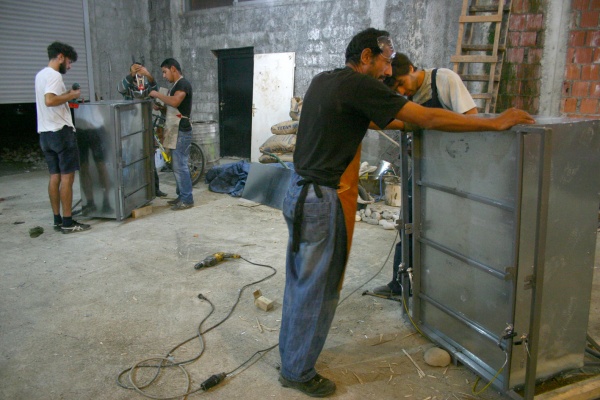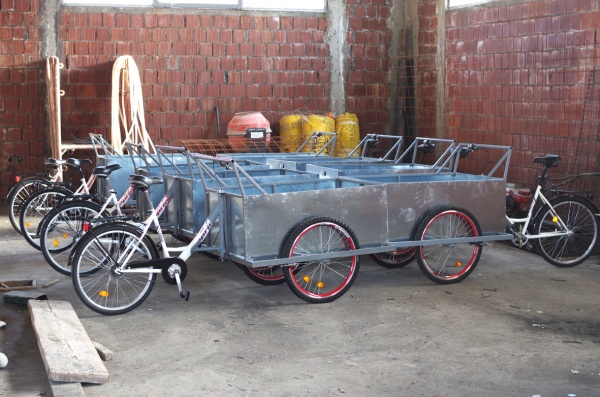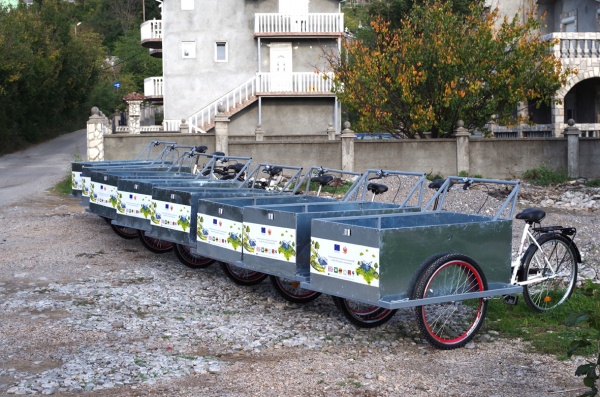Cargo Tricycle Workshop in Podgorica (Montenegro)
Report on cargo tricycle workshop, held in Podgorica from 4th to 8th November 2013.
In July 2013 Karkatag collective was contacted from Help organization, office in Montenegro, with a call to organize cargo bike building workshop with Roma participants from Konik camp in Podgorica. The idea was to apply Karkatag workshop approach that is imposing using of professional tools and direct contact with material for all the participants while they are working on producing functional machines and mechanisms. In this situation the plan was for participants to produce cargo tricycles that they will be using for their small businesses. The goal of the workshop for participants was familiarization with working process, tools and materials; systematization of the knowledge they already have on making, fixing and repairing the bicycles and deeper understanding of the value of machines, tools and goods they usually get for free from different humanitarian organizations as a disadvantaged group.
The workshop was organized from 4th to 8th November 2013 with first day reserved for final preparation and remaining 4 days for working on tricycles with participants. There were 3 trainers and 8 participants, divided in two groups, one working with tutors in the morning and other in the afternoon, each shift lasting 4 hours. The plan was also for tutors to stay after working with participants to finish the segments of the process that are too complex and require advanced skills. In total the process lasted 53 hours (net), 32 of which working with participants.
The workshop was full success, with 8 tricycles built by the end of the process, end what is even more important, they were built almost completely by the participants themselves. Workshop layout, based on hands on approach ended up to be highly suitable and motivating for this group. Participants was given opportunity to use, with constant guidance and supervision but completely freely all the tools of the trade. That fact made the atmosphere of trust and mutual respect between tutors and participants. In that setting transfer of experience was going both ways, with even us as trainers learning few tricks on bicycle maintenance from some participants.
Majority of the participants had limited previous experience with such working process. Working process itself consisted of three different segments that will be analyzed and presented separately.
First segment is designing and it was done completely by trainers prior the workshop to maximize the efficiency of the process. In this segment there was possibility for the participants to be involved in final stages as they showed lot of interest in customization of their tricycles. Involving participants in designing process is also usual practice of Karkatag collective.
Second segment is metalworking that could be further divided into two sub-segments. One is basic metalworking (cutting, grinding, riveting and preparing metal parts for assembly). With these skills most of the participants had some experience but needed supervision to raise and maintain the level of their skills to the level needed in the process. Other sub-segment is advanced metalworking, which implies welding and assembling. On this segment the tutors were most concentrated. In this segment participants needed most of the guidance and also this segment was crucial for final smooth functioning of the tricycles. Skills used in this part of the process was mostly new for participants but majority of them, especially young ones were learning fast and by the end were able to work independently with given parameters.
The third segment was represented with bike maintenance skills. With these skills most of the participants had lot of experience and were able to perform tasks independently.
One unexpected quality of workshop was that for efficiency, the tutors had to guide more than one project in the same time. That setting broke the usual relation of one tutor guiding one small project and made participants organize randomly in smaller groups and address different tutors depending on a task they are performing in a moment. That made whole group more coherent and focused on cooperation. Also till the very end they were building tricycles together, collectively as a single project without thinking which one will belong to whom in the end of the process.
In the end we would like to highlight some of the participants:
-Elvis Krasnići for big capacity to understand the whole process and dedication to work -Kemal Beriša for advanced bicycle maintenance skills and for fast adopting of welding skills -Emra Ademaj and Elvis Ramo for welding learning capacity and growing skills
Final conclusion from our side as tutors and co-organizers responsible for technical and educational aspects of this workshop is that it was highly successful and efficient. Also workshop brought lot of positive side-effects thus fulfilling all the goals foreseen. In this way it completely met Help’s formula of help through self-help.
In Belgrade on 21.11.2013.
For Karkatag collective
Aleksandar Popović
Pictures of the result

|

|

|